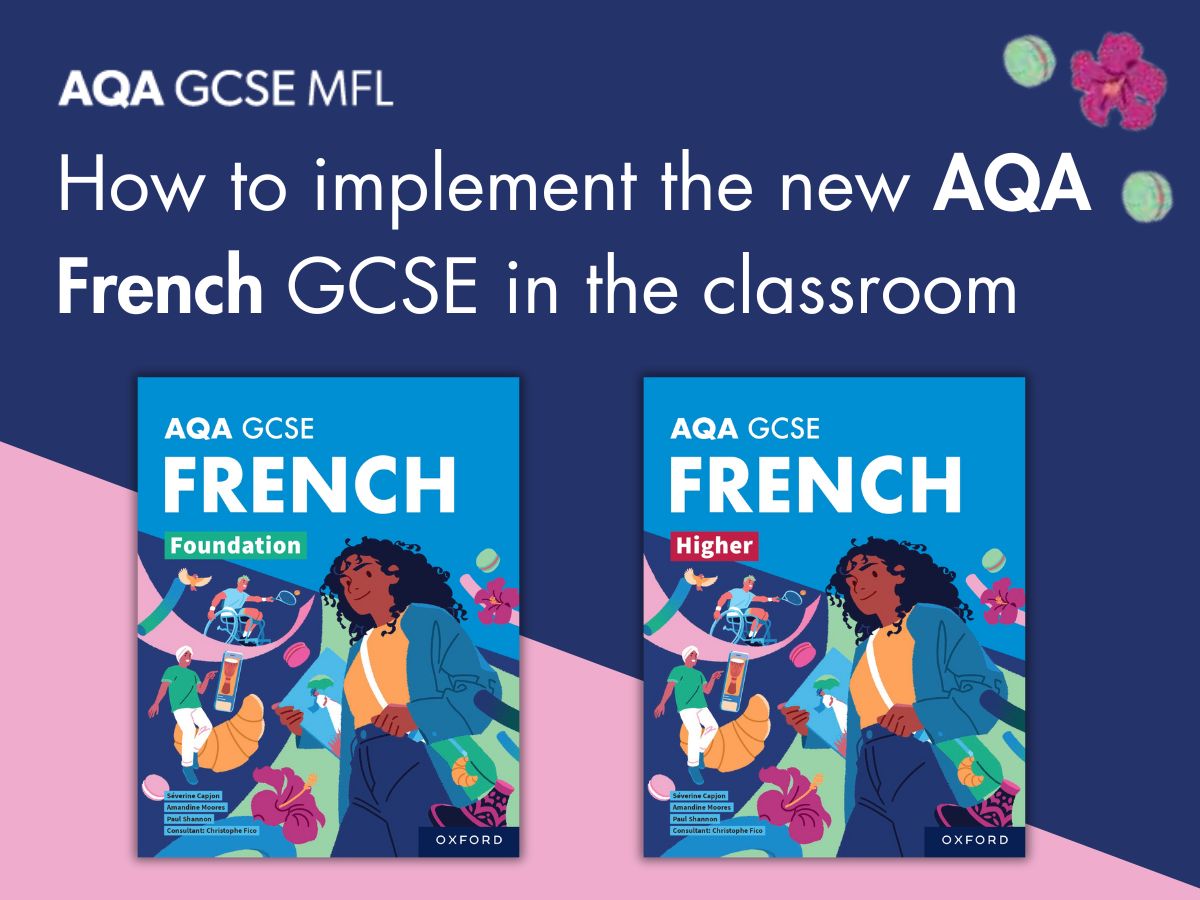By Séverine Capjon, author and French teacher
‘Wait, what? The French GCSE specification is changing again?!’ This is the comment I made when a colleague informed me that the Department for Education (DfE) and Ofqual were working on a new French GCSE. I find change in education a little daunting but I was relieved to read the new specification. It brings a fresh approach to language learning, and a renewed focus on enjoying the subject and enabling learners of all abilities to succeed.
So, what are the main changes and how can you best prepare your students for them?
- A new approach to vocabulary teaching:
The new specification includes a comprehensive vocabulary list of 1,200 lexical items for the Foundation tier and 1,700 for the Higher tier. These words are part of the most commonly used vocabulary in the French language and therefore apply to a variety of topics. This should enable students to regularly revisit the same words throughout the course, in different contexts.
For example, the word forêt can be taught within almost all topics listed. A good activity to practise that word, along with words linked with it could be the ‘word association game’. This game is played in groups or as a whole class. The first person says forêt and the next person has to say a word that is related to forêt such as arbre, plante, fleur, se promener, grande, dense etc… This continues around the group and if someone can’t think of a word within ten seconds, they’re out. An added challenge could be for students to have to choose words related with forêt but which are not directly linked with the topic they’re learning. For instance, if they are learning forêt as part of the topic of ‘free time’, they shouldn’t say vélo or courir.
Another vocabulary change with the new GCSE is that any word included in the exam papers that is not part of the published list will be glossed*. As one of the authors of the new AQA GCSE French Student Book from Oxford University Press (Oxford), I can vouch that extreme care has been taken to include as many words from the list as possible. As per the exam papers, the few words that we have included that are not on the list, are glossed. The introduction pages also give students useful words for that particular theme, which enables them to produce language from the get go.
- Themes and topics:
You will be relieved to know that the themes and topics are largely the same. Whilst some have been re-ordered and given different titles, ‘celebrity culture’ is the only new topic. This should pique students’ interest and can be approached in many different ways. It could be a good opportunity for teachers to embrace the digital celebrities of the Francophone world, but also to reflect on what it means to be famous, the pros and cons of fame and why people might seek fame.
Some of you may be disappointed that the ‘social issues’ topic has been removed, but the key vocabulary remains and can be taught within other topics. For instance, the topic of ‘healthy living and lifestyle’ enables teachers to talk about well-being and addictions, while ‘where people live’ can be an opportunity to teach social issues associated with different Francophone countries.
- Speaking and phonics:
The teaching of phonics, or sound symbol correspondences (SSC) is making a comeback, as is the emphasis on using spontaneous speech, mainly in informal contexts. Students may feel this is a more dynamic and relevant approach to speaking in French. A completely new task is the read aloud activity which requires students to read French material aloud (35 words for the Foundation tier and 50 words for the Higher tier) and then answer questions on that text’s theme. This will require explicit teaching of SCCs and much practice to ensure that students are confident enough with their pronunciation and fluency on the day of the exam.
In Oxford’s AQA GCSE French Student Book, this task features heavily on all topics so that teachers can feel confident they have resources they can use at their fingertips.
Students could also practise this task by recording themselves and reflecting on their pronunciation, intonation and overall delivery. This could then be done in pairs or groups. In addition, a group activity could be a dialogue reconstruction where students would have to rearrange sentences in the correct order and then read the dialogue aloud as a group.
- Listening – Dictation:
When I mentioned to my team that students will have to perform a dictation task as part of their listening exams, some colleagues thought that it was ‘too difficult’, ‘old-fashioned’ and ‘not engaging enough’. I personally remember les dictées fondly in my French school days – yes, I felt the pressure to perform with extreme accuracy, but it did mean that I had to understand the grammar inside out and apply it correctly in each context. In addition, isn’t strong grammar knowledge one of the bases of language learning? I see strong scaffolding as a key element to prepare students for this new challenge. Some simple ‘fill the gaps’ activities (with a bank of words provided for lower-ability students) can be introduced after teaching a particular grammar point and SCC, as early as Year 7. Letter-by-letter or sound-by-sound dictation could be used to practise specific spellings, or why not use minimal pair dictation? Dictate pairs of words that differ in only one sound, such as blanc and blond.
It is not all about exams:
Passing on our love of language learning continues to be at the centre of our job. Far from just being about vocabulary and grammar, learning a language also means learning the cultures of where it is spoken. The new AQA GCSE French specification emphasises cultural aspects to provide students with a well-rounded understanding of the French-speaking world. In particular, it encourages the teaching of cultural heritage, festivals and traditions, arts and entertainment. It also focuses on the French-speaking world beyond France.
The new AQA GCSE French Student Book from Oxford includes a plethora of cultural texts and dedicated culture pages to other countries. This way, students will be able to develop an appreciation for cultural diversity in the Francophone world. I always make time in my lessons for cultural discussion and research projects. Students love it and I am always amazed by the quality of their work. This is a chance for them to embed all they’ve learnt in a particular topic in a meaningful and relevant way.
In summary, this new GCSE brings an exciting blend of language learning and cultural appreciation to the classroom. Students will be learning skills that extend far beyond exams and with the new approach to speaking, they should feel more confident navigating authentic situations. For us teachers, it is a chance to refresh and renew our resources, as well as brush up on some of our teaching techniques. AQA has already developed sample material and resources which you will find available by clicking here.
The new AQA GCSE French Student Book has been written to carefully match the new specification: it features all vocabulary from the list, all of the grammar points students need to know, and plenty of opportunities to practise the new assessment tasks.
*Apart from the dictation exercise where two words from outside the vocabulary list will be included at both tiers.
You can access sample chapters from the new French Student Books from Oxford by signing-up here, if you haven’t already, and the books are available to pre-order now in time for publication early 2024.
Oxford’s AQA GCSE Spanish resources are matched to the new AQA GCSE German specification** for first teaching from September 2024.
** Oxford’s Student Books and Kerboodle Books have been entered into an approval process with AQA.
Click to view our author blogs about implementing the new AQA GCSE German and AQA GCSE Spanish 2024 specifications.

Séverine Capjon is a native French speaker from Cannes and has lived in the UK for 15 years. Holding various roles in the East of England since she started teaching in 2009, Sev is now Head of French in a comprehensive secondary school in Suffolk. Sev has examining experience and has collaborated on several textbooks and digital resources across Key Stages 3 and 4.

